Yes, these are unprecedented times (Maybe you're tired of hearing that phrase.) But solutions to some of the problems leaders are facing right now are already out there: They might even be in a book sitting on your bookshelf in your home office.
Much classic leadership wisdom still rings true, and leaders are finding new meaning and relevance in their favorite books. Consider these recommendations from our community for nine books that can help guide you through the challenges you are facing right now.
Execution: The Discipline of Getting Things Done
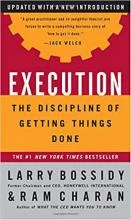
By: Larry Bossidy, Ram Charan, and Charles Burck
Book description (from Amazon): The book that shows how to get the job done and deliver results … whether you’re running an entire company or in your first management job. Larry Bossidy is one of the world’s most acclaimed CEOs, a man with few peers who has a track record for delivering results. Ram Charan is a legendary advisor to senior executives and boards of directors, a man with unparalleled insight into why some companies are successful and others are not. Together they’ve pooled their knowledge and experience into the one book on how to close the gap between results promised and results delivered that people in business need today.
Why you should read it: “This book was very influential to me as a newly minted leader,” says Jay Ferro, CIO of Quikrete. “Disciplines like strategy and innovation are critical, and admittedly ‘sexier,’ aspects of leading an organization, but a key differentiator between an ordinary team and an exceptional team is the ability to execute.”
“During this time of great change, especially, we have to be adaptable, focus on priorities, and then deliver. People must always come first, but they must be set up for success in a culture that rewards positivity, collaboration, and execution. This book provides a framework focused on getting things done rather than just the theory of planning. I’ve read this book three times and while it’s probably not as politically correct today as it was 18 years ago, many of its principles are timeless. Strategy without execution is hallucination!” says Ferro.
[ Culture change is the hardest part of transformation. Get the digital transformation eBook: Teaching an elephant to dance. ]
Act Like A Leader, Think Like A Leader
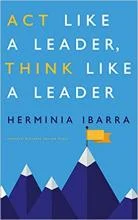
By: Herminia Ibarra
Book description (from Amazon): You aspire to lead with greater impact. The problem is you’re busy executing on today’s demands. You know you have to carve out time from your day job to build your leadership skills, but it’s easy to let immediate problems and old mind-sets get in the way. Herminia Ibarra – an expert on professional leadership and development and a renowned professor at INSEAD, a leading international business school – shows how managers and executives at all levels can step up to leadership by making small but crucial changes in their jobs, their networks, and themselves.
Why you should read it: “I picked up this book because it came highly recommended for leaders who are looking to have a greater impact,” says Cedric Wells, veteran director of IT business solutions. “I have a growth mindset, and I learn through action and experimentation, so I enjoy the direct experiences and perspectives the author covers in the book. It’s particularly relevant now because so much has changed – the old-school ways of thinking and leading have to evolve with the future of work and managing people. So if you are looking to become a better leader and take your career to the next level, this may be one to add to your reading list.”
Ask for More
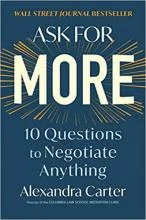
By: Alexandra Carter
Book description (from Amazon): Negotiation is not a zero-sum game. It’s an essential skill for your career that can also improve your closest relationships and your everyday life, but often people shy away from it, feeling defeated before they’ve even started. In this groundbreaking new book on negotiation, Ask for More, Alexandra Carter – Columbia law professor and mediation expert who has helped students, business professionals, the United Nations, and more – offers a straightforward, accessible approach anyone can use to ask for and get more.
Why you should read it: “All too often, parties go into negotiations without really knowing what they want to achieve and why,” says Dave Egts, chief technologist of Red Hat’s North America Public Sector. “The book is broken down into ten questions. The first five questions help you flesh out what you want out of the negotiation and why. The remaining five questions help you tease out what the other party wants. Leading with transparency encourages the other party to be more transparent, as well. The end result is everyone playing their cards face up, so both parties win.”
The Power of a Positive No
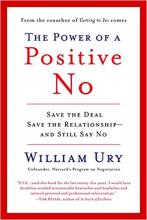
By: William Ury
Book description (from Amazon): The secret to saying No without destroying relationships lies in the art of the Positive No, a proven technique that anyone can learn. This indispensable book gives you a simple three-step method for saying a Positive No. It will show you how to assert and defend your key interests; how to make your No firm and strong; how to resist the other side’s aggression and manipulation; and how to do all this while still getting to Yes. In the end, the Positive No will help you get not just to any Yes but to the right Yes, the one that truly serves your interests.
Why you should read it: “I frequently recommend this book to my coaching and consulting clients,” says Bob Kantor, founder of Kantor Consulting Group. “In order for our ‘Yes'es’ to have an impact, we need to also be able to say ‘No’ in such a way as to continue to strengthen our relationships. Ury’s framework enables us to say yes to our relationship while saying no to a specific request or behavior.”
“This has always been a critical skill for IT leaders, given how often we’re seen as the ‘masters of No.’ And it’s even more critical now as our organizations deal with radical ambiguity and the need for rapid digital transformation. His technique is effective when working down, across, and upward in our organizations,” says Kantor.
The End of Average: How We Succeed in a World That Values Sameness
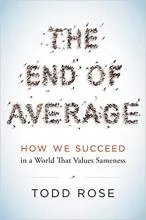
By: Todd Rose
Book description (from Amazon): Rose, a rising star in the new field of the science of the individual, shows that no one is average. Not you. Not your kids. Not your employees. This isn’t hollow sloganeering—it’s a mathematical fact with enormous practical consequences. But while we know people learn and develop in distinctive ways, these unique patterns of behaviors are lost in our schools and businesses which have been designed around the mythical “average person.” This average-size-fits-all model ignores our differences and fails at recognizing talent. It’s time to change it.
Why you should read it: “In this book, Rose, a developmental psychologist and faculty member at the Harvard Graduate School of Education, talks about how classification systems (for example MBTI) are just a shortcut for trying to understand the world,” says Drew Bird, founder of The EQ Development Group. “While we think we gain an advantage by using such measures, Rose argues that we actually lose a great deal as we fail to understand the individual complexity that makes each of us who we are.”
“As leaders, while these classification systems help us understand individuals better, they are not the end of the learning. We must accept that while every team member may have specific preferences, the strength of that preference, and the way in which it is situationally variable, is what a leader really needs to understand. An easy example of how these categorization systems can be misused or misunderstood can be heard in statements like, ‘Introverts will like working from home (not true), and extroverts will miss being around others (also not true).’ It’s been a while since I read this book, but the fundamental message has proven to be very valuable to me in my work in recent months.”
Let's examine four more intriguing book recommendations:












